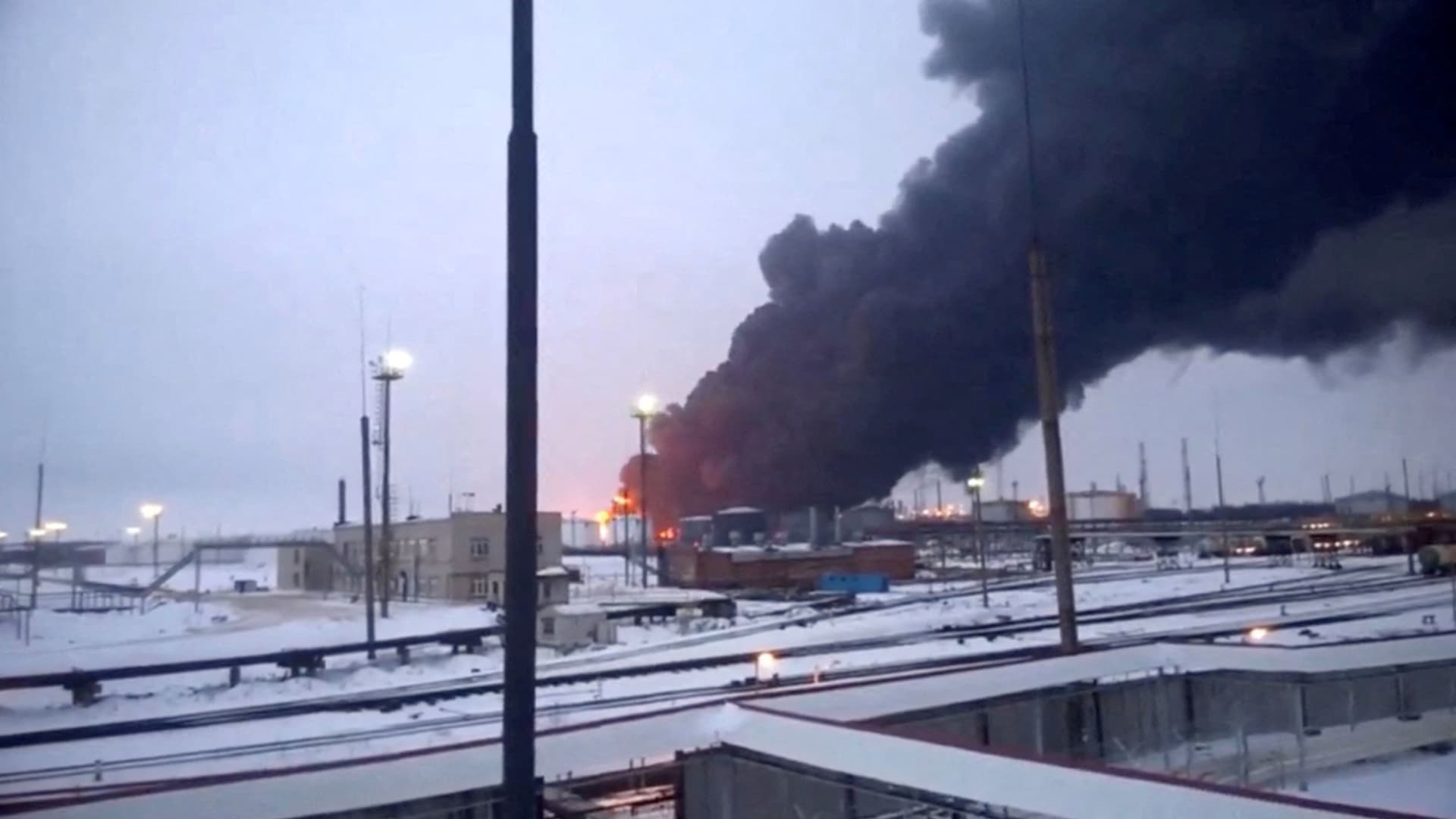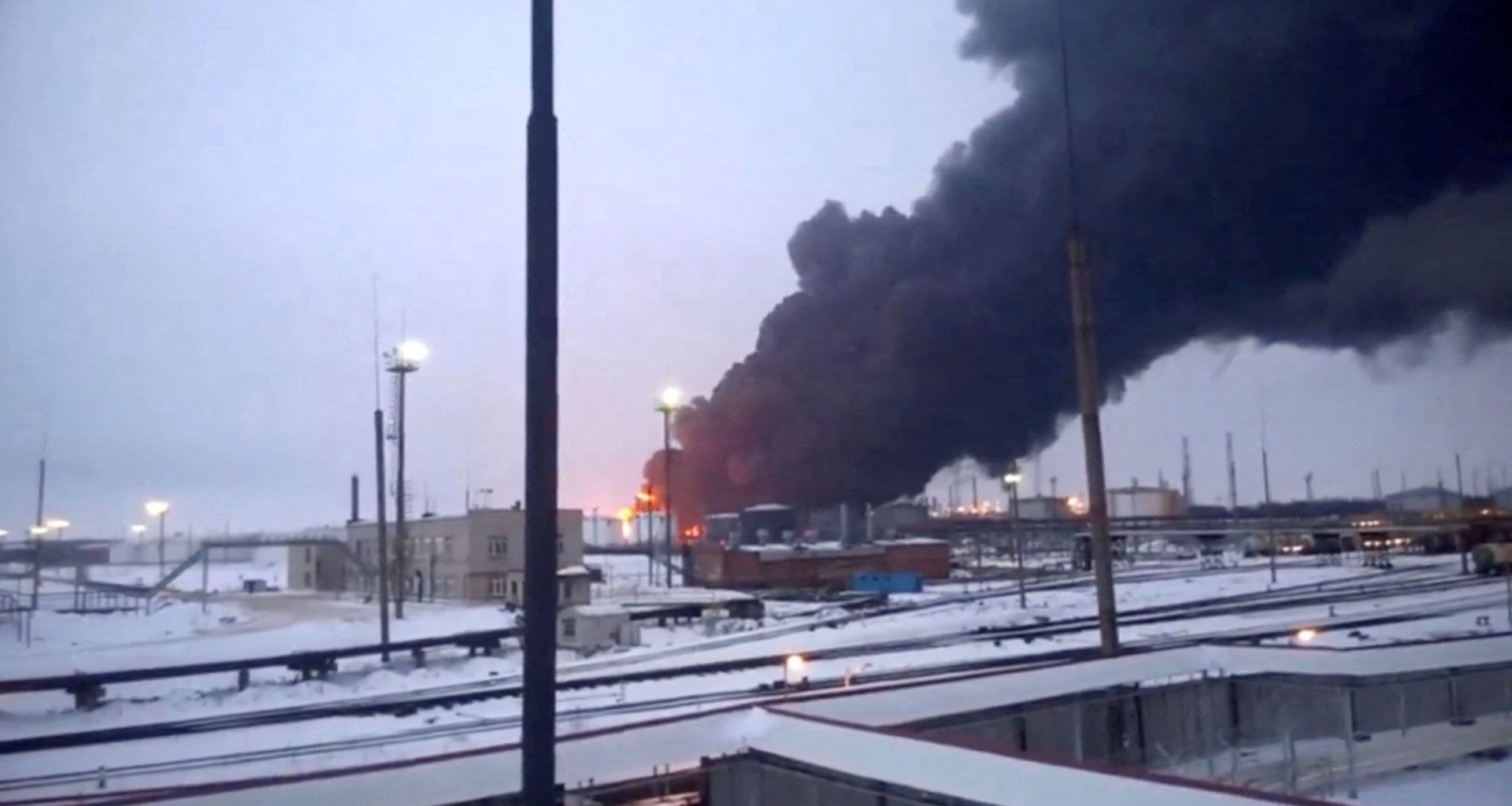
Smoke billows after Ukraine’s SBU drone strikes a refinery, amid Russia’s attack on Ukraine, in Ryazan, Ryazan Region, Russia, in this screen grab from a video obtained by Reuters, March 13, 2024.
Video Obtained By Reuters | Via Reuters
Ukraine’s campaign of attacks against Russian oil refineries is demonstrating how relatively cheap drones that utilize artificial intelligence could pose a major threat to global energy markets.
Ukraine-launched drones have hit 18 Russian oil refineries this year with a combined capacity of 3.9 million barrels per day, according to report published by JPMorgan earlier this month. Some 670,000 bpd of Russian refining capacity is currently offline due to the strikes, according to the bank.
Ukraine’s capabilities are growing with its drones now demonstrating a substantially longer range. Earlier this month, Kyiv hit Russia’s third-largest oil refinery, Taneco, which is located up to 1,300 kilometers — roughly 800 miles — from the frontlines, according to JPMorgan.
Ukraine is increasingly using drones that are enabled with AI, which helps the weapons navigate and avoid jamming, according to the bank.
“The AI guidance also delivers strike precision, maximizing the impact of the strikes by targeting specific areas like distillation towers, repairs of which requires Western technology,” Natasha Kaneva, head of global commodities strategy at JPMorgan, told clients in the April report. “This makes the repairs costly and often require equipment that the country is not able to produce.”
U.S. Defense Secretary Lloyd Austin made clear Tuesday that the Biden administration is worried about the strikes in a rare airing of public disagreement with U.S. allies in Kyiv.
“Certainly, those attacks could have a knock-on effect in terms of the global energy situation,” Austin told the Senate Armed Services Committee. “Quite frankly, I think Ukraine is better served in going after tactical and operational targets that can directly influence the current fight.”
The U.S. has urged Ukraine to stop the attacks on Russian energy infrastructure out of concern that they could drive up crude oil prices and instigate retaliation from Moscow, three people familiar with the discussions told the Financial Times last month.
The losses to Russian refining capacity could worsen as Ukraine aims to build a full-fledge drone industry and produce a million units domestically this year, according to the JPMorgan report. If Kyiv is able to extend the drones’ range to 1,500 kilometers (about 932 miles), they could potentially hit 21 refineries with more than 4.4 million bpd of refined capacity, according to the report.
“There’s room for this to become a bigger problem, because we’ve come to count on Russian supply getting to the global market, which allows other non-Russian supply to go to other places,” said John Kilduff, an energy expert and founding partner at Again Capital.
The deployment of AI drones also has broader implications for global energy markets, according to Bob Brackett, a senior research analyst at Bernstein. The drones are cheap to produce compared to the millions of dollars in damage they can cause and could empower nonstate actors to challenge superior fighting forces, Brackett told clients in Friday note.
“These drones can easily and asymmetrically disrupt global seaborne trade,” Brackett wrote, warning that oil exporters such as Russia aren’t the only countries that need to be worried. Oil importers, like China and India, will now have to worry about disruptions to crude flows from drone attacks, he said.
Impact on oil, gasoline prices
Ukraine’s campaign of drone strikes comes at the same time as tensions are running red hot in the Middle East, with OPEC member Iran and Israel now teetering on the brink of a direct confrontation.
U.S. crude oil has rallied nearly 20% this year, while the global benchmark Brent has gained 17% as the wars in Middle East and Eastern Europe rage against the backdrop of rising crude demand and tightening supply. Gasoline futures have surged about 33% since the year began.
Bob McNally, president of Rapidan Energy, said the drone strikes are not a major issue for oil prices right now because the attacks on refineries are primarily affecting Russia’s production of diesel at a time when the market is already glutted.
But Russia is also major exporter of a gasoline feedstock called naphtha. If naphta markets were to tighten because of the attacks it could have an impact on gas prices and balances, said McNally, who served as a senior energy official in the George W. Bush administration.
Goldman Sachs said in a research note last month that the strikes are bullish for diesel prices, but the impact on crude oil is mixed. Outages can lead to reduced oil demand from refineries, which is bearish for prices. But the market is worried Ukraine could increasingly hit oil production and transportation infrastructure, which would weigh on Russian crude exports, according to Goldman.
Bart Melek, head of commodity strategy at TD Securities, said the current strikes could have an indirect effect on oil markets. As Russian fuel exports decline due to the attacks, countries that rely on those exports then need to source fuel from refineries in other jurisdictions, Melek said. Those refiners need more crude to meet the demand which can stress oil supplies, he said.
Russian production already poses a problem for the Biden administration. Moscow has pledged to cut its oil output and exports by an additional 471,000 barrels per day in the second quarter to meet its commitments to OPEC+.
Those cuts could push the price of Brent crude to $100 by September, which will put pressure on the Biden administration just before the presidential election, according to a JPMorgan report last month.
The investment bank expects U.S. gas prices to hit $4 per gallon by May, the highest level since the summer of 2022.
“There are few issues that terrify a sitting American president in an election year more than surging gasoline prices,” said Rapidan’s McNally.
— CNBC’s Michael Bloom contributed to this report
Read More: World News | Entertainment News | Celeb News
CNBC










